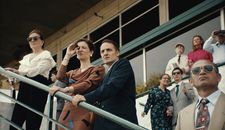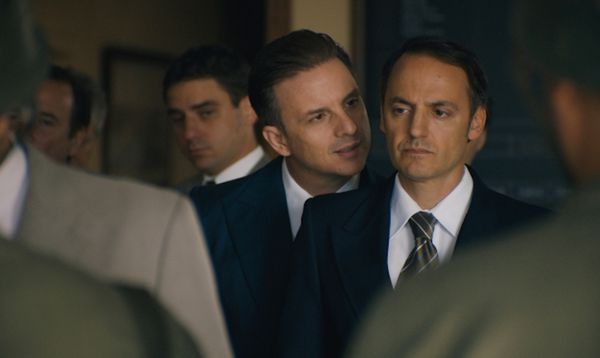 |
| Andreas Fontana’s haunting Azor, co-written with Mariano Llinas, stars Fabrizio Rongione and Stéphanie Cléau: “The cinematography was done by Gabriel Sandru and we were talking a lot about that.” |
Andreas Fontana’s Azor, co-written with Mariano Llinas, shot by Gabriel Sandru with costumes by Simona Martínez, stars Fabrizio Rongione (Jean-Pierre Dardenne and Luc Dardenne’s Two Days, One Night opposite Marion Cotillard, The Unknown Girl, The Kid With A Bike; Eugène Green’s The Son Of Joseph) and Stéphanie Cléau (Mathieu Amalric’s The Blue Room, their adaptation of Georges Simenon’s novel).
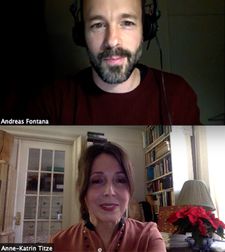 |
| Andreas Fontana with Anne-Katrin Titze on Jorge Luis Borges: “Borges of course in terms of literary inspiration is very important.” |
In my discussion with the director we touch on the influence of Howard Hawks and Jorge Luis Borges, Joan Didion’s codes and games, casting director Alexandre Nazarian (Arnaud Desplechin’s Oh Mercy!, Ismael's Ghosts, My Golden Days; Guy Maddin’s Seances and with Evan Johnson The Forbidden Room; Mathieu Demy’s Americano), the cinematography, costumes, and filming in Argentina with non-professional actors, “men who are very impressive”.
Boredom is seen as “divine punishment,” old money detests new money and vice versa in Azor. We, the spectators, are let in to a point to watch, but never long enough to really understand, until we are swatted aside like the horsefly that settles for a second on the wife’s red bathing suit by the pool. “Now they disappear horses,” we overhear. Trees shot from above look like broccoli and a real war of greed has broken out.
Ivan de Wiel (Rongione), private banker from Geneva, Switzerland, arrives in Buenos Aires with his wife Inès (Cléau). A military coup has plunged the country into turmoil. De Wiel is in Argentina to take over the business left behind by his banking partner René Keys (played by Alain Gegenschatz), who had disappeared without a trace. Keys is a cypher and it is impossible to get a clear sense of the man de Wiel is to replace.
From San Sebastián, Andreas Fontana joined me on Zoom for an in-depth conversation on Azor.
Anne-Katrin Titze: Hi Andreas!
Andreas Fontana: Hello, how are you?
AKT: I’m fine, where are you?
AF: Right now I’m in Spain in San Sebastian.
AKT: I loved how you used names in your film. There is symbolism and yet they feel completely organic. There is the character of René Keys, of course. It took me a while to figure out de Wiel [try pronouncing Satan with a French accent]. Lazaro makes perfect sense. When did the names enter the narrative?
AF: It’s a good question. I mean, I’m easily inspired by names. A name is like a whole story of a lot of things, summed up in just one word. Every name is the story of some biography. Also it’s a kind of musical game, like an ironic play, not only symbolic but also to work with the simple musicality of the name and what it brings, like the possibility of a joke with the spectators. In the early beginning I was trying different names and possibility of games.
AKT: The game quality and the codes actually made me think of Joan Didion [the interview took place before her death on December 23, 2021].
AF: I’m a huge reader, also literature from the United States. Joan Didion is a US writer?
AKT: Yes, a great one. The mood of Azor and certain invented South American countries and the fact that we never know exactly where we are despite specifics reminded me of her writing. Anyway, having a man replacing someone else is structuring the whole story. I find it very interesting that you start out with the one being replaced, so that audiences don’t get it really at first viewing. Is Keys holding the strings for the psyche of everyone else?
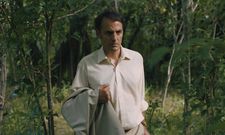 |
| Andreas Fontana on Fabrizio Rongione as Ivan de Wiel: “Fabrizio is more of an intuitive person.” |
AF: I think yes, the challenge was to try relate to the audience a combination of things that remain very simple and easy to understand in this complicated world of private banking and Argentinian dictatorship. The situation of a man replacing another one is very simple and efficient. I’ve been in this situation a few times It’s a very simple tension situation.
You had a very good filmmaker, Howard Hawks, saying that the better drama is when somebody is replaced in a situation of danger. It’s a very simple situation of danger for a bureaucrat. With Keys, it was not to show him, but just the absence of him, which left an impossible hole for the other one. Again it was like a game, writing. This is very structural but for me it was a very stimulating way to write.
AKT: The visuals are sometimes breathtakingly beautiful. I am thinking of for instance of the horseback riding scene in the overgrown countryside that is compared to Haussmann’s grands boulevards in the owner’s great grandfather’s time. The landscape is often fantastic, but the sound design makes it feel ominous. Can you talk a bit about the juxtaposition of cinematography and sound design?
AF: The cinematography was done by Gabriel Sandru and we were talking a lot about that. I’ve been doing research for two and a half years just to understand what was this world. It was very important to do the shape of the movie and we decided to work old school way. That meant not to make the choice in post-production, but to make the choices during the shooting. In terms of light, in terms of lens, of course frame, but also just deciding everything within the shooting.
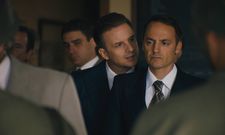 |
| Dekerman (Juan Pablo Geretto) has some dubious advice for Ivan de Wiel (Fabrizio Rongione) |
Of course Argentina, it’s a very impressive country but the difficult thing and the challenge was not to be seduced by all these impressive places and just to show everything. Because the movie was that, to let a lot of things out of frame, even the spectacular places. Something I discovered while we were shooting and also during editing was that Buenos Aires is very very noisy. These people are living as if in a bubble, apart from the normal society. So the possibility to create this out of frame with the sound was very important. The difficulty was to create this intense silence in a very noisy place. The balance between the silence and the city was interesting to look for.
AKT: The scenes in the private club with the clergy become more and more menacing. Somebody talks of Geneva being the favorite city of Borges because it doesn’t change. And there you have a country in total turmoil with Ivan as the visitor from stand-still Geneva. How did Borges enter the picture? Was his writing a big influence on certain aspects of your film?
AF: Yes, it’s a good question. I mean, yes, Borges is a great influence for me, but difficult to exactly know how and why, because Borges is important for a lot of people and certainly in my movie is so present. I think in that particular scene it was interesting that I was shooting with non-professional actors. One is a private banker, a real one, another one is a financier, a third one is a lawyer, etc. They are all from this kind of world. The guy who plays this character who tells the joke about Borges, it was a proposal by him. “Ah, when we talk about Geneva, why don’t we talk about Borges?”
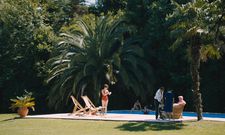 |
| Andreas Fontana on not making choices in post-production: “In terms of light, in terms of lens, of course frame, but also just deciding everything within the shooting.” |
And I said “Yes, it’s a good idea, just try it.” And then he had this strange tale of Borges, it was perfect because it tells so much about them. Cultured but also a private joke between this club of men [Bruno Dumont told me a similar story about one of the journalists in France coming up with a Brecht quote used in his film]. Borges of course in terms of literary inspiration is very important. Politically, he’s a conservative writer, so it was interesting that it had some layers. I think movies can play with these doors a little bit open but not completely.
AKT: Many doors are not very open, they give us merely a little glimpse into a strange world. One scene I particularly like because of how it is setting us up to get a wrong idea at first, is when the de Wiels visit the widow. The two women speak in French, the two men speak in Spanish, they overlap, we think we know what’s going on and we don’t at all. At all! This is a wonderful double dialogue. You mentioned Howard Hawks, he couldn’t have done this any better.
AF: It’s a very good question. Actually the first scene I wrote in the movie is this one. The way I wrote it the first day is quite the same that is in the movie. The idea of the movie began with that because for me it was of course important to create some plots for these strange characters. But my main goal was more to describe this kind of society and the way they talk and the way they act and look at each other.
All these things are happening during a mundane conversation. Of course mundane conversation is a trap for the director because it is difficult to use. It was interesting to use it as a formal challenge. To let the audience be completely lost and to think, okay, what I have to understand is not coming by the language but by other things. It’s the first scene I wrote.
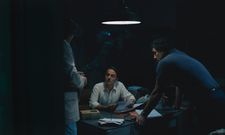 |
| Andreas Fontana: “Fabrizio is very good, but I think he hasn’t yet had his moment. I hope it will happen, as early as actually this moment.” |
AKT: The actors are excellent. Stéphanie Cléau I recognised from Matthieu Amalric’s The Blue Room and Fabrizio Rongione was in Two Days, One Night by the Dardennes with Marion Cotillard.
AF: Yes.
AKT: They work great as a couple and you make them look very much 1980, but also timeless. Can you tell me a bit about the casting?
AF: Yes, of course. I’ve been working on the French part of the casting with Alexandre Nazarian, who is a very important casting director in Paris. We talked about casting people with lots of experience but not so visible yet in the movies. Fabrizio is very good, but I think he hasn’t yet had his moment. I hope it will happen, as early as actually this moment. And Stéphanie, she is not an actress, actually she is a theatre director and she was playing in The Blue Room.
We wanted something really organic and we only met something like eight possibilities for Ivan and six for Inès. We made some combinations, working on different scenes, but hardly working, I mean just a few hours. Then we decided that Ivan and Inès could be Stéphanie and Fabrizio because something chemical was happening. But not chemical in the way of seduction, chemical in the way like tension, strange tension.
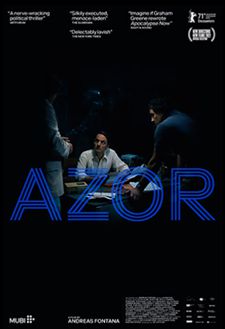 |
| Azor is streaming on MUBI |
AKT: The moment when she says to him “Your father was right, fear makes you mediocre.” There is tension for you.
AF: It was interesting because Stéphanie is an intellectual and Fabrizio is more of an intuitive person. I mean, he doesn’t want to understand everything and she wants to. So their different way to work was very interesting putting them together. Because they were in a completely uncomfortable zone, they don’t know Argentina, they were working with non-professional actors, men who are very impressive.
AKT: A word about the costumes, which I liked very much, from the bathing suits, to her style, to what she decides he wears.
AF: I’m not a specialist for costumes. The production Ruda Cine in Argentina arranged a meeting with Simona Martínez Ribero, who is a great woman. At the beginning it was complicated with her because she wanted something very precise and I said, “okay, I will use their own clothes sometime and sometimes when it’s not possible, mixed with yours, just find something.”
I wanted something like shades of different suits, sometimes in brown and sometimes something in gray or blue. It was very much like the idea of colorimetry and nothing more. I have to say that she has been working a lot pointing to the kind of colours.
AKT: It worked all together very well into this fantastic dream of a film. Thank you so much!
AF: Thank you very much!
Azor is streaming on MUBI[film][/film]








